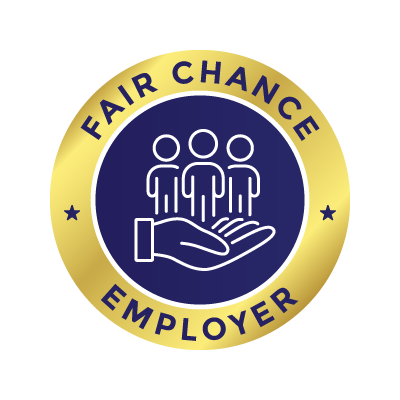The United States is in the middle of one of its biggest labor shortages in history. There are more job openings today than there are people looking for work. Recent data suggests that there are “8.8 million job openings in the U.S., but only 6.3 million unemployed workers.” In Utah, there was roughly one unemployed person for every three job openings last year. This means that unless every unemployed person in the state worked three jobs, there are nowhere near enough people to fill all open positions.
With millions of available jobs but fewer people working, businesses throughout the country face staffing shortages, lost profits, and the risk of shutting down. This negatively impacts our local and national economy.
While these statistics may seem grim, they also present an opportunity. A huge segment of the population looking for work has too often been ignored, rejected, and disfavored during the hiring process — those with a criminal record. Fair chance hiring practices remove the barriers that make it difficult for justice-involved people to find gainful employment. These efforts open doors for the millions of people with a criminal record across the country, which not only provides the individual with a better quality of life, but also prevents crime, lowers rates of reoffending, and helps build a stronger workforce.
It is estimated that up to 100 million Americans have a criminal record; Of that population, 27 percent are out of work, and unemployment rates nearly double — up to 60 percent — for those who have been recently released from prison. A recent study revealed that nearly half of unemployed men in America have a criminal record.
90 percent of employers ask about a person’s criminal history on a job application and “14 percent of employers eliminate 20 percent or more applicants with criminal histories from consideration.” For those with a criminal record, checking the box is not only an embarrassing reminder of their past mistakes but also a source of stress as it disqualifies them from a variety of positions, regardless of their experience or efforts they have made to change since their conviction.
These are not the only barriers justice-involved people experience when on the hunt for a job. When hired, people with criminal records often report less pay, worse benefits than their coworkers, and minimal opportunity for upward mobility. In fact, formerly incarcerated individuals earn about half as much as the average worker in America.
Unfortunately, many employers miss out on hiring good workers due to misconceptions about people with criminal records. It is common for employers to believe that justice-involved people are likely to reoffend and are less skilled than other employees. They believe hiring someone with a record would harm their business, lead to negligent hiring lawsuits, deplete company resources, make other employees uncomfortable, or they will have high turnover rates.
In reality, recent studies by the Society for Human Resource Management have shown that 85 percent of HR managers believe people with records are as skilled, or more skilled at their jobs than those without a record, and have among the best retention rates. 96 percent of employees have stated they would welcome a person with a criminal record onto their team, and be prouder of their workplace if they were more open to hiring justice-involved people.
However, the National Fair Chance hiring landscape is changing as high-level CEOs are beginning to speak up. Jamie Dimon, CEO of JPMorgan Chase, has been a long time advocate for fair chance hiring. JPMorgan Chase is among the most influential and highly respected companies to utilize fair chance hiring processes, with 10 percent of new hires at the company being people with records. In his 2021 op-ed in the New York Times, If You Paid Your Debt to Society, You Should Be Allowed to Work, Mr. Dimon argues “we should continue to push for other policies at the federal and state level that are good for the economy and spur job creation for people who have paid their dues.”
However, being willing to hire someone with a record is different than creating an environment where someone with a record can thrive. It includes seeing justice-involved people as indispensable, talented, and capable people to have on your team; it includes treating them as you would any other employee, which means paying them fairly, providing them with the same benefits and training opportunities, and making the same types of jobs available to them as people without records.
Fair chance hiring should be a common practice in the workplace and employers that invest in people with records will find that it is good for their business. It is in the best interest of companies to create a better, more inviting, more inclusive, and supportive environment for all of their employees, including those with criminal records.
If you are looking for resources for finding a job with a criminal record, indeed has an excellent guide here.




